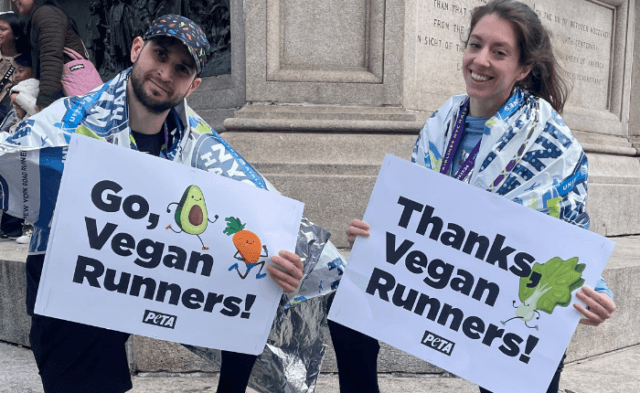I cringe when I see demonstrators snarling—unless they’re screaming “God Hates Fags” or “Obama Is a Communist.” Then I’m delighted to see them sabotage their message with angry, thoughtless actions and words. I’ve done a bit of demonstrating myself, from civil-rights marches to Occupy Wall Street, and even donned animal masks for PETA demos at the National Institutes of Health back in the day.
PETA proves that you can sometimes attract the media’s attention by wrapping the message of compassion in an engaging stunt because it gives the local television outlets and newspapers an arresting visual.
When a cluster of toned nude folks tell you that they’d “rather go naked” than wear dismembered dead animals, the overt message may or may not immediately persuade you, but subliminally it registers that those bodies, trimmed of flabby bellies and thighs, were achieved and maintained by means of a healthy and cruelty-free vegan diet.
Having Pamela Anderson, Russell Simmons, and other good-looking celebrities tell their fans why they have turned vegan has destroyed whatever lingered of the stereotype of vegans and vegetarians as unattractive weaklings. If people like and admire someone, they will listen to the message and be more likely to take it to heart.
Sincere as they may be, advocates who hector passersby turn away more people than they convert. Telling people that they are evil and going to hell does not change the heart of anyone with half a brain or an ounce of self-respect. You have to engage people with reasonableness and courtesy before they will listen. Otherwise, we are simply serving ourselves by unloading the dismay and disgust that we all feel in the face of animal slavery and abuse.
If you are a talented cook, invite omnivorous friends to your home for a vegan meal. If you aren’t a capable cook, take them to a good vegan restaurant. Over the decades, I’ve had more success than I expected simply by example. If you believe, as I do, that using animals for human purposes is slavery and killing them is murder, wait for a serious moment in an honest cordial conversation before letting others know, but never try to shame them. Criticizing another person’s life makes them defensive.
Demonstrations remain useful, and laws are still needed, but they must be accompanied by acceptance. The cause of civil rights benefited when audiences saw actors of color playing sympathetic characters. The same thing applies to equal rights for LGBT people. After decades of perpetuating stereotypes, movies and television began to feature roles that allowed minorities to appear as complex and real characters of many types.
Although I table at animal rights events once in a while, I am more comfortable writing books. My field is history. For the last few years, I have put that knowledge to use in a series of crime stories. Animal issues appear several times in each novel, and the main characters, sisters who run a popular boardinghouse for vaudevillians and actors in early 19th-century Boston, serve a variety of vegetarian meals that expose their clients to humane alternatives.
Enough vegan recipes appear in the Porridge Sisters Mysteries that readers requested a cookbook from our American Vaudeville Museum, so in 2012, Donald and I published the Porridge Sisters Cookbook of Hearty Vegan Fare: Crackpot Notions, Opinions, Quotes, Gossip, Quips.
Compassion for people and animals imbues our crime stories (even while the Porridge Sisters gleefully track down murderers). In all the many forms of media, you can attract more listeners (or readers) by making the message part of the entertainment. At least, we have found it so.
PETA 
(Routledge Press, 2007), Murder at the Tremont Theatre
(2010), Murder at the Old Howard
(2011), and Murders at the Orpheum Theatre
(2012). The Fourth Porridge Sister Mystery will be published late in 2013. All the books are available at Vaudeville.org and through Amazon U.S.A. or U.K.
PETA is a participant in the Amazon Services LLC Associates Program, an affiliate advertising program designed to provide a means for sites to earn advertising fees by advertising and linking to Amazon.com.





